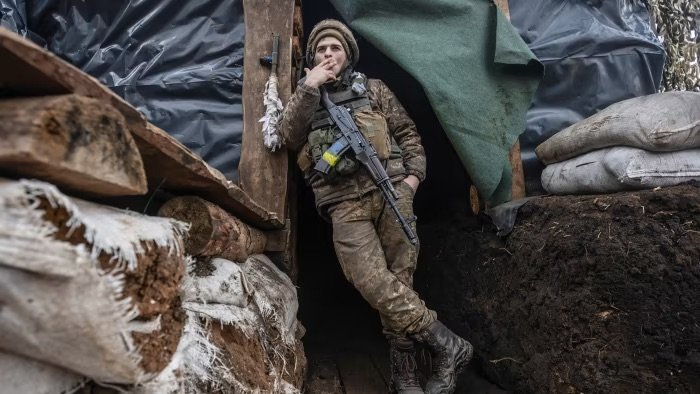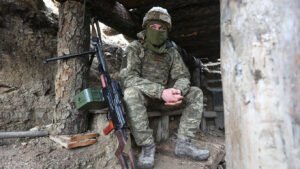RIYADH, Saudi Arabia (AP) — Senior U.S. and Russian officials are set to engage in crucial discussions aimed at improving bilateral relations and exploring potential steps toward ending the war in Ukraine. This marks the most significant diplomatic engagement between Washington and Moscow since Russia’s full-scale invasion nearly three years ago.
Scheduled for Tuesday in Saudi Arabia, the talks signal a shift in U.S. strategy under the Trump administration, which is working to end Russia’s diplomatic isolation. The discussions are expected to lay the groundwork for a future meeting between U.S. President Donald Trump and Russian President Vladimir Putin.
The renewed U.S. engagement with Russia has caused concern among Ukraine and its allies, who fear that Washington and Moscow might negotiate a deal that does not fully consider Kyiv’s interests. In response, France convened an emergency meeting of European Union members and the U.K. on Monday to strategize a response.
Key Participants and Goals
Russian Foreign Minister Sergey Lavrov and Putin’s foreign affairs adviser Yuri Ushakov departed for Riyadh on Monday, according to Russian state television. On the U.S. side, Secretary of State Marco Rubio, National Security Adviser Mike Waltz, and Special Envoy Steve Witkoff will represent Washington, as confirmed by State Department spokesperson Tammy Bruce. Notably, Ukraine will not participate in the talks.
Kremlin spokesperson Dmitry Peskov stated that discussions would focus on “restoring the full scope of U.S.-Russian relations” and exploring ways to resolve the Ukraine conflict. Meanwhile, Bruce emphasized that the U.S. delegation aims to assess Russia’s sincerity about peace negotiations.
“The objective is to determine if this is a viable path forward,” Bruce told reporters traveling with Rubio in Riyadh. She clarified that while Ukraine is not part of these initial discussions, any formal peace negotiations would require its involvement. This contrasts with U.S. policy under Trump’s predecessor, Joe Biden, which insisted that Kyiv play a central role in any settlement.
U.S. Approach and Ukraine’s Concerns
Speaking on Fox News Channel’s Sunday Morning Futures, Witkoff said he and Waltz were attending the talks under direct instructions from President Trump, expressing hope for “meaningful progress on Russia-Ukraine.”
However, questions remain over whether a settlement would require Ukraine to cede territory to Russia. Last week, U.S. Defense Secretary Pete Hegseth suggested that NATO membership for Ukraine was unlikely and hinted that Kyiv may need to reconsider its goal of reclaiming all its lost territory—two key demands from Putin.
These discussions represent a significant expansion of U.S.-Russia diplomacy, following years of strained relations. Lavrov and former U.S. Secretary of State Antony Blinken previously had a brief, 10-minute exchange at a G-20 summit in India nearly two years ago, which did little to improve tensions. Additionally, in late 2022, senior U.S. and Russian intelligence officials met in Turkey amid fears that Moscow might escalate to nuclear weapons following battlefield setbacks.
Trump’s Direct Engagement and European Reactions
Tuesday’s talks follow a recent phone call between Trump and Putin, in which the two leaders agreed to initiate negotiations immediately. This conversation marked a major shift in U.S. policy, effectively ending Russia’s diplomatic isolation following its invasion of Ukraine in February 2022. After the call, Trump informed Ukrainian President Volodymyr Zelenskyy of the discussions.
On Sunday, Trump told reporters that Zelenskyy “will be involved” in the peace process but did not provide details. Meanwhile, Zelenskyy confirmed on Monday that Ukraine had not been invited to the upcoming talks and warned that any outcome without Kyiv’s participation would not be acceptable.
“These U.S.-Russia talks will not produce any results,” Zelenskyy told journalists in the United Arab Emirates, emphasizing that Ukraine must be part of any negotiations. He also announced plans to visit Turkey and Saudi Arabia this week, though he insisted his Saudi trip was unrelated to the U.S.-Russia meeting.
European officials have also expressed concerns, urging that the EU be included in any discussions about Ukraine’s future. Lavrov, however, dismissed their involvement, stating, “I don’t see what they have to do at the negotiation table.”
Russia’s Stance and Future Steps
When asked about expectations for the Riyadh talks, Lavrov said that Trump and Putin had agreed to “move past an abnormal period in our bilateral relations” and resume dialogue on key global issues.
“There is no thought of Russia giving up any of its territorial gains,” Lavrov stated firmly.
Putin’s demands for a peace settlement remain unchanged: Ukraine must withdraw from four regions that Russia annexed in 2022 but never fully captured and must abandon its bid to join NATO—conditions that Kyiv has outright rejected.
Meanwhile, Trump’s special envoy for Russia and Ukraine, retired Gen. Keith Kellogg, is set to visit Kyiv on February 20 to discuss security guarantees with Ukrainian officials. Zelenskyy stated that he plans to take Kellogg to the front lines to provide firsthand insight into Ukraine’s security concerns.
Zelenskyy also acknowledged Trump’s suggestion that Ukraine open its mineral resources to U.S. investment but insisted that any such agreement must be tied to formal security guarantees. Kyiv remains adamant that without robust security assurances, Russia could launch another invasion, even if a deal is reached.
While Ukraine continues to seek NATO membership, Hegseth’s comments suggest that Washington may not actively support this goal. However, Zelenskyy remains hopeful that economic and military assistance could form part of a broader security arrangement.
Ukraine also aspires to join the EU, though officials acknowledge that the process is complex and could take years.
Looking Ahead
As the U.S. and Russia prepare for their most consequential talks in years, the outcome remains uncertain. While Washington and Moscow appear eager to explore diplomatic solutions, Ukraine and its European allies remain wary of any agreement that does not fully account for Kyiv’s security and sovereignty.
With Trump and Putin seeking a new diplomatic framework, the coming weeks could prove critical in shaping the future of the Ukraine war—and global geopolitics.

 English
English




























































